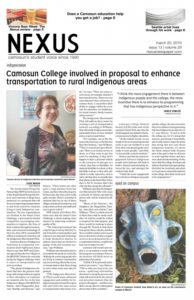I once did a 10-day silent meditation retreat: no internet, talking, reading, writing, working out, or even making eye contact with other people. No nothing—just sitting in meditation all day for 10 straight days. It was absolutely the longest 10 days of my life. But I realized something very important: wanting to escape from the retreat—and I wanted to more often than not—was the same thing as wanting to escape from my life, from existing.
In school, we are learning, acquiring knowledge through taking in large amounts of information. We are cramming about as much information as possible into our brains and then spewing it out, one paper after another, one test after another. In school we analyze and attempt to explain things. We gather hoards of information and create innumerable categories. But do we understand ourselves? Do we know what we are, directly? Do we value what is simple and can only be experienced in the present moment, like breathing? Are we centred, content, or inwardly peaceful?
It’s one thing to know about something or to explain it. We can explain how the lungs work, and how breathing happens. Nevertheless, most people walk around all day every day intermittently holding their breath, or breathing shallowly, or clenching their pelvic floor muscles so that their diaphragm cannot descend fully, making it impossible to breath normally—which has more harmful effects than you can imagine.
Meditation does not impart any conceptual understanding, which is perhaps why it is not widely valued in our culture or integrated into our schools. Meditation is a tool that shows us how to just be here, without need for stimulation, entertainment, or distraction. Meditation teaches us how to stop trying to escape ourselves. Meditation is a gateway into an infinite inner world in which it becomes clear that all conceptualization is extremely limited and cannot, on its own, solve any of our problems. Information and productivity, therefore, are grossly overrated.
I’m not saying we should stop learning or going to school. Gathering information has its place and can be very useful and enjoyable. But we are severely out of balance. We have all but lost the ability to sit still and observe ourselves—our breathing, physical sensations, thoughts, and emotions—the ability to experience life directly,to be comfortable right where we are, as we are. Paradoxically, the inner spaciousness created from stillness and silence allows for better use of information—our thinking is clearer, our ideas more organized. School becomes easier! It is not only valuable to be able to sit in observant stillness, it is essential for human well-being.
The value of being able to simply be where we are, totally and fully, is greater than most people realize. It is nothing less than the ability to actually live life instead of seeking endless distractions—including being hyper-focused on information and intellectualization—from it.
The benefit of knowing how to just be, and breathe, and allow what is to be as it is, is enormous. It is the ability to truly listen to another person, to transcend addiction, to integrate information in a truly meaningful way, to create spontaneously, to feel content, and to connect with others.
Why then, is meditation not a part of our institutions of higher learning?

